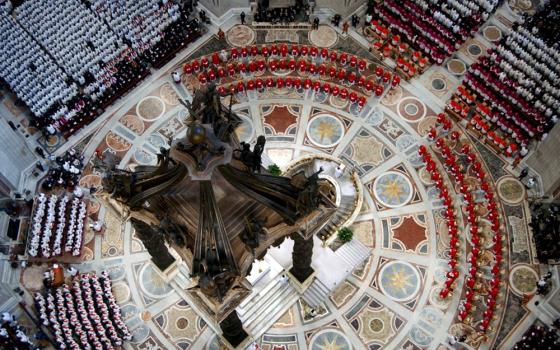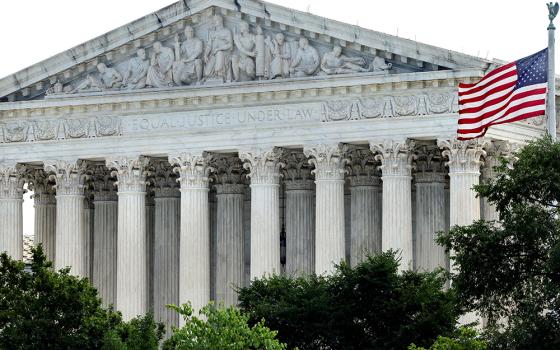If Christmas is around the corner, that means Fox News is busy ranting about the “war on Christmas.” This year, Sarah Palin has a book out on the topic and it is found on the New York Times best-seller list. The whole business about a war on Christmas illustrates some of the most acute pathologies of American religiosity.
The supposed war on Christmas revolves around two charges. First, that God is being banned from the public square because public space is not given over to Christian displays, and, second, that our commercial enterprises now shrink from using the words “Merry Christmas” and, instead, “ place “Happy Holidays” on their banners and advertisements.
Christians who are grumpy about the fact that they cannot have a crèche in front of town hall are providing an instance of a broader indictment of the culture, first articulated with thoroughness and vigor by the late Fr. Richard John Neuhaus in his book “The Naked Public Square.” I have never entirely bought the meme. Certainly our nation’s political debates are still dripping in religious language and argumentation, with the left articulating a vision of social justice that borrows heavily from Scripture and the right articulating a felt need for a stronger moral fiber that is more explicitly religious. Just look at the discussions last year generated by the fact of two Roman Catholics vying for the vice-presidency: On any given day, either Joe Biden or Paul Ryan was being called a bad Catholic by somebody.
The deeper problem is that many people, indeed, many Christians, no longer seem to consider their faith when making decisions or framing their more worldly interests and concerns. In this sense, yes, God is being driven out of the public square, although the problem seems especially acute among academicians, who tend to overstate their cultural influence. Still, anyone who thinks this is a new problem has not been paying attention. The idea that significant parts of life should be segregated from dogmatic concerns runs back to the sixteenth century. We have been living this secularization story for almost 600 years. As Brad Gregory demonstrated in his magisterial book of the same name, there was an “Unintended Reformation” in the sixteenth century that produced the secularization of society. The fact that this has a long history does not mean we should give up the fight, but it does invite us to search deeper into the causes and challenges of secularization.
I have no particular objection to a high school chorus singing “Silent Night,” except, of course, the aesthetic concern that it is a tough song to sing and one that is easily, and usually, butchered. I have no problem with their being a crèche in front of town hall. But, the jurisprudence of our Supreme Court regarding the First Amendment’s religion clauses is, as I noted yesterday, a ghoulash. They have ruled that it is fine to have the crèche provided it is one among many displays, including a menorah and, say, Santa and his reindeer. So, the crèche can be there, but only if it is relativized by the presence of other symbols. The court’s rulings in this area may be a victory for the First Amendment, but it is no victory for the Christian faith.
This concern to have a public display reflects a strange quality in American religiosity, a concern with form over substance. You see this all the time. The most recent example is Liz Cheney’s stated opposition to same-sex marriage. She attended her sister’s same-sex wedding, and told the happy couple that she was happy for them. But, she doesn’t want the thing legalized. So, same-sex marriage is fine for her highly educated, rarified family, but a civilizational threat if extended to the hoi polloi? I find the same concern among some pro-life activists who evidence little sympathy for the challenging circumstances of a mother facing an unwanted pregnancy, and also do not seem to extend much concern for the child. To them, it is the idea that God’s law has been broken that offends. Most of the pro-life people are not like this, but there are plenty of preachers who talk this way.
A few years ago, Cardinal Francis George expressed his gratitude to evangelical Protestantism for keeping the language of the Bible alive in the culture. He is undoubtedly on to something, but I think the observation needs to come with a giant caveat. (And, I know, I know, I am not getting any ecumenical points here.) It is not just that evangelical Protestants read the Bible differently from the way we Catholics do. It is that they almost read a different Bible. A few years back I was at the grocery store. I must have been waiting for a prescription or something because I wandered into the slim book section. One of the books was entitled “100 Bible Quotes Everyone Should Know,” or something like that. I picked it up. Only 14 of the 100 quotes were from the Gospels. I knew that no Catholic or Orthodox editor had compiled the list. Of course, I wish more people possessed biblical literacy, but I wish to know what is meant by biblical literacy before applauding the fact without reservation. Same with public displays of religiosity. If the goal is to feel good about the maintenance of social norms, who gives a damn?
I also think we should be wary of denouncing the sentiments of those who have reservations about public displays of religiosity in our pluralistic culture. There are truly some atheists who are simply obnoxious zealots. But, there is also something disarming when a religious personage does not use every occasion to explicitly proselytize. I think of Pope Francis’ meeting with members of the media, in the days after his election last March. When it came time to impart his blessing to the crowd, he noted that many members of the media were not Catholics and, so, respecting their conscience, he offered his blessing in silence. That was very powerful.
The second basic charge in the war on Christmas campaign is that commercial enterprises are also forcing Christmas out of the public square by now declining to place the words “Merry Christmas” on their displays and advertisements and, instead, using the phrase “Happy Holidays.” If you think the challenge to Christian faith in the Incarnation posed by Macy’s and Wal-Mart et al., is that they now adorn their ads with “Happy Holidays,” permit me to invite you to a deeper sense of social criticism. Our consumer culture has turned Christmas into a time to teach little children how to be greedy. It is appalling.
I was always suspicious of Santa. Certainly, the idea of a nice old man, with a white beard, showing up out of nowhere to bestow gifts on little children is a lovely idea, and not a bad way to teach very small children the idea of gratuitousness. But, this being America, where religion is always reduced to morals, we were told at a very early age that Santa only brings gifts to good little boys and girls. Pelagianism for toddlers. Then, around the age of five, Mom and Dad have to explain that – spoiler alert – there is no Santa. I am not sure how much credibility Mommy has after that. And, how does a five year old process the idea that while Santa may be fake, Jesus is real and Mommy can be counted on not to be fibbing this time.
In recent years, I have pledged myself to staying as far away from the stores as possible. Most of my friends now get a Christmas quiche as their present. (N.B. my quiche lorraine does happen to be the best quiche on the planet. The key is to sauté the onions in the bacon fat and to add my secret mix of ingredients to the eggs.) Occasionally, I will purchase something I know my Dad really needs for him, and this requires a very quick trip to a store. I make my own Christmas cards even though I am the least artsy-crafty person I know. NCR has a list of ideas for gift giving that can help your family take the nasty commercial edge off the holiday. And, whatever else you do, make sure your children know that it is the giving of gifts that is the most important thing, not the receiving.
No matter what we do, however, we must face the fact that the real meaning of Christmas is a sublime one, and our commercial culture does not do very well with sublimity. Adults might read the last book of Pope Benedict’s trilogy on Jesus of Nazareth, which treats the infancy narratives, but I would actually suggest preparing for a real Christmas by recalling his words in the first volume in the trilogy:
Now, it is true that this leads to the great question that will be with us throughout this entire book: What did Jesus actually bring, if not world peace, universal prosperity, and a better world? What has he brought? The answer is very simple: God. He has brought God…..He has brought God, and now we know his face, now we can all upon him. Now we know the path that we human beings have to take in this world. Jesus has brought God and with God the truth about our origin and destiny: faith, hope and love. It is only because of our hardness of heart that we think this is too little.
Here is an Advent way to prepare for a truly blessed Christmas, to ask ourselves that question: In our hardness of heart, do we think Jesus has brought too little? Is He enough for us? If all of us can answer yes to those questions, then we will have no need of public displays, we will take no heed of those “Happy Holiday” signs. We will be too busy setting the world on fire with our joy.






